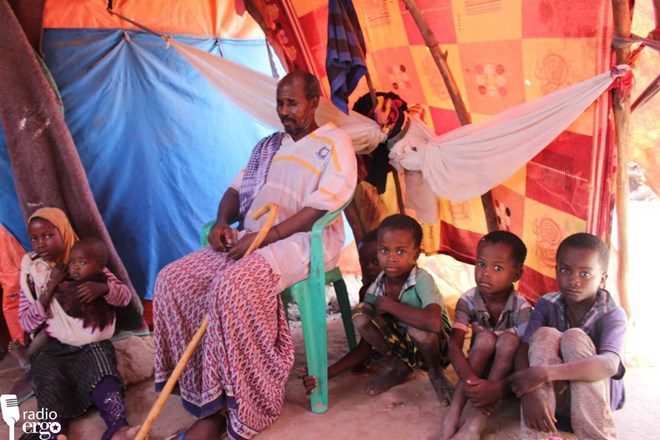
Thursday July 11, 2019

Ahmed Farah Gedi, 55, is one of the people living with disabilities in Kulmiye camp, Beledweyne. He was previously a proud provider for his family but for the past one year, half of his body has been paralysed. He and his family now depend on food handouts they get from their neighbours in the camp.
“I no longer have the ability to work and I have been reduced to a beggar. I previously used my physical abilities to earn a living. I only use my eyes now but my legs are paralysed,” Ahmed told Radio Ergo.
“I used to go wherever I wanted,” he added, vividly recalling his healthy days.
Ahmed was woken up by sharp pains in his body late one night. The pain was unbearable and left him briefly unconscious. His family and neighbours rushed him to Beledweyne general hospital. The doctors told him that the paralysis was caused by high blood pressure and had damaged the nervous system. However, he was not told if the paralysis was permanent or could be cured.
Ahmed is a father of six with an eldest son aged nine. His wife has been occupied with giving extra care and support to her bedridden husband and her children, leaving no one to earn a living for the family.
He used to hawk bread and pastries in the city, while his wife owned a small stall selling small items. The two streams of income used to support them fairly comfortably.
“Although it was not easy, I used to have a better life. I never used to depend on aid handouts from the people or aid organisations,” said Ahmed. “I was an agro-pastoralist before I was displaced. I had my livestock and I worked on my farm. I was dependent on my physical abilities.”
Ahmed’s family live in a small hut covered with pieces of cloths, which cannot shelter them from rain although they get cover from the sun and cold at night.
Prolonged drought in the region wiped out all the family’s livestock three years ago and they were forced to migrate from Nur-Fanah village, 55 km from Beledweyne, towards the town.
There are many IDPs in Beledweyne living with disabilities. Barwaqo camp does not have a health centre to provide the much needed health services.
Saido Burale Guled’s husband sustained injuries to his spinal cord. She told Radio Ergo that the burden of feeding their 10 children has fallen wholly on her. She gets up early and goes out to find jobs cooking for city families.
Saido’s husband has never been taken to hospital and their relatives, who are farmers, do not have the capacity to help. They are all facing poor harvests and water scarcity.
“We have not taken him to hospital. We can only take him somewhere if we have money, you know? We don’t have money, his relatives are destitute, the farms have not produced much, and sometimes even the children can’t get food,” Saido told Radio Ergo.
Saido’s family was displaced by conflict in Mogadishu several years ago. Her husband then was working as a porter with a handcart. Her children are not being educated as there are no free schools in the camp and she cannot afford to pay fees at the private schools.
Kulmiye is a sprawling camp, set up in 2015, hosting more than 200 families hit by drought and conflict in the south. There are no water wells or other free water sources and people fetch water from the river. Only those earning something can afford to buy water.
“We beg around for water in the neighbourhood. After knocking on five or 10 doors, you might be lucky to get one who is helpful enough to help you get water. You will get two jerry cans but you can see they are not enthusiastic about giving.
Now you don’t know if you should give the water to children for drinking, or use it to cook or wash clothes,” Saido said.
There are no flows of aid in this camp and there are no health, education or water services.